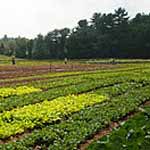 If prostitution is the “oldest profession,” farming is likely the second oldest. Humans have been farming for thousands of years and, if they want to continue to eat, they’ll be farming for thousands of years more. Young people don’t see much future in farming (unless it’s locally grown organic food), and small towns and rural areas in the United States continue to bleed population. But there’s an argument to be made that farming has a great future.
If prostitution is the “oldest profession,” farming is likely the second oldest. Humans have been farming for thousands of years and, if they want to continue to eat, they’ll be farming for thousands of years more. Young people don’t see much future in farming (unless it’s locally grown organic food), and small towns and rural areas in the United States continue to bleed population. But there’s an argument to be made that farming has a great future.
Agriculture is already one of the United States’ biggest export sectors, and overseas markets are likely to continue to grow as developing the world population increases and rising incomes increase food consumption. Those mega-trends portend a favorable environment for large-scale agribusiness capable of moving large volumes of food commodities. Meanwhile, the rise of the locally grown food movement will create opportunities for community gardens and artisinal producers serving local markets.
That future of agriculture may not look like today’s massively mechanized, resource-intensive farming industry. It will be more knowledge-intensive, utilizing insights from biology and ecology to grow crops with fewer herbicides, pesticides and fertilizers. It will be less labor intensive, as leaf and berry pickers replace unskilled migrant workers. As the nature of the business changes, farming could well rebound as a career path for the young. As Joel Kotkin and Mark Schill write in New Geography, “The farms of the future are increasingly high-tech and run by highly skilled professionals and technicians.”
As we think about how to revitalize the economy of rural/small town Virginia, we don’t give much thought to stimulating agricultural production. Perhaps we should.
On the surface, the data compiled by Kotkin and Schill seems none too encouraging for Virginia. They honed in on metropolitan regions with at least 5,000 total jobs falling into one of 68 ag– and food production-related industries, including crop and animal production. Only four Virginia metros made it onto the list (Richmond, Harrisonburg, Hampton Roads and Washington-Arlington), and they ranked in the bottom half of the 124 regions listed. But that’s OK. I see farming and agribusiness as relatively untapped opportunity — fields of opportunities ripe for entrepreneurial innovation.
(This article first ran in Bacon’s Rebellion on May 25, 2015)
- The Most Progressive Budget in Virginia’s History - December 21, 2019
- When is a Clean Water Act Permit Needed? - December 21, 2019
- Should U.S. Consider Modern Monetary Theory to Improve Economy? - December 21, 2019

